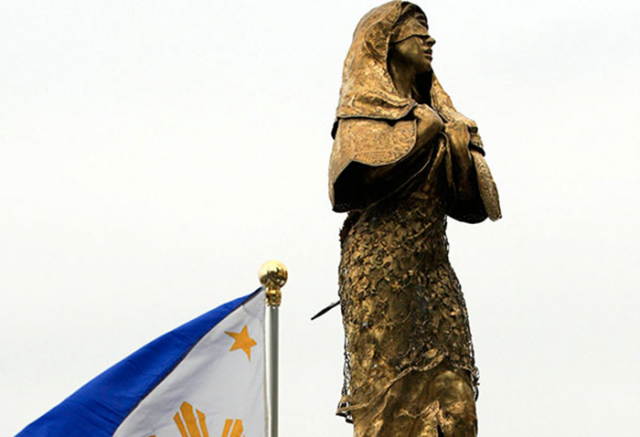
A month after the Department of Public Works and Highways removed the comfort woman statue along Roxas Boulevard, a battle to address the history behind the banished effigy has started to gather steam.
Mounting outcry
Since the monument’s removal, several women’s rights proponents have decried the government’s agency’s decision.
Gabriela Party-List recently announced that it would be filing a house resolution seeking to investigate the removal of the statue.
Today we will file a House resolution to push an investigation on the removal of the comfort woman statue in Manila.
No to historical revisionism! Justice for all comfort women! pic.twitter.com/lBXdzpnuCY
— Gabriela WomensParty (@GabrielaWomenPL) May 10, 2018
The women’s rights party has pushed through on a promise made last April 2018. Gabriela representatives Arlene Brosas and Emmi de Jesus were among the first to denounce the move. De Jesus called the monument’s removal a “blatant insult to the surviving comfort women.”
Numerous advocates have sounded off following the decision to remove the statue. In place of the evicted effigy, one user posted a picture of another figure protesting the atrocity.
The removal of the Comfort Woman statue impedes any progress we had towards honoring the lives of the women who faced great adversity and this is an action we actively condemn.
We call for immediate return of the statue!
Honor the comfort women!#JusticeForComfortWomen pic.twitter.com/FKsk6ETdOT
— Madelene de Borja ?? (@_MaryMadelene) May 4, 2018
Another user gave a brief but informative rundown of the wartime atrocities that haunts the country’s collective memory.
In light of the news of the removal of the comfort women statue due to pressure from Japan, which is apparently supported by the President, let me tell you about "comfort women", or wartime sexual slavery. This will be a (long historical) thread. Let's go.
— Manic Pixie Dream Witch ? (@mncpxiedrmwitch) April 30, 2018
In a recent interview with media, Jonas Roces, who was commissioned to create the monument, claimed that it was created not as a form of protest but as a “reminder of our history.”
The statue has been returned to him. The sculptor revealed that it was Tulay Foundation, a Chinese-Filipino group that commissioned him. The sculpture was approved by the National Historical Commission.
Comfort women’s long battle for justice
Decades after the Japanese occupation ended, those who suffered from the depravity of the occupying forces still cry for justice.
When Japanese prime minister Shinzo Abe visited in 2017, several survivors of the atrocity took the streets to seek reparation.
In the controversial 2010 Supreme Court decision in Malaya Lolas v. DFA, Justice Mariano del Castillo ruled against a petition filed by a non-profit organization seeking aid for the rape victims from the Japanese occupation.
Castillo as ponente dismissed the case on the basis of improper fora and argued that it is the executive which has the sole prerogative to espouse the organizations search for reparation.
“The Executive Department has determined that taking up petitioners cause would be inimical to our country’s foreign policy interests, and could disrupt our relations with Japan, thereby creating serious implications for stability in this region,” wrote del Castillo in the decision.
The Malaya Lolas’ counsel was Harry Roque, now spokesperson of President Rodrigo Duterte.
A battle also fought on other shores
Interaksyon reported on Duterte’s concurrence with the decision out of a desire “not to antagonize other nations.”
The Department on Foreign Affairs as early as December 2017 questioned the erection of the statue.
In South Korea, the movement seeking for reparation from Japan has also made headway. After a series of protests crying for justice for comfort women, President Moon Jae-in scored Japan for the atrocity, asking them for genuine reflection on the issue.
Japan had previously apologized to South Korea and provided a 1 billion-yen fund for the victims.
In 2017, buses in Seoul installed comfort women figures onboard as protest and reminder.









